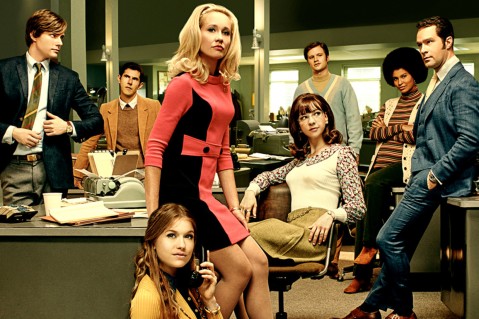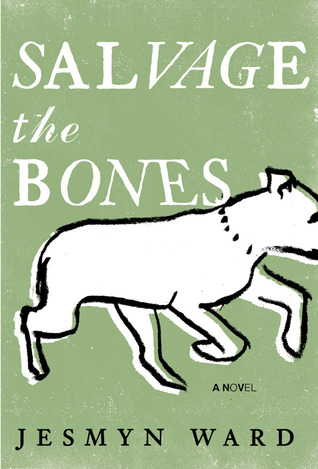TV show: Good Girls Revolt (2015-2016) created by Dana Calvo

The genius of Good Girls Revolt wasn’t in how it dealt with its central premise and raison d’etre: the suit filed by the female research assistants at News of the Week for the right to be reporters. The genius of the show was how it dealt with everything else. Looking back on lives and times, we tend to lose our sense of perspective. We focus on the singular events, the turning points, the times that changed. We lose sight of the fact that those events, points, and changes were also just a day in the life. Most things that happen are a long time coming, but the coming is hard to recapture after the impact of the arrival.
Good Girls Revolt captured that coming perfectly. The lives of the women, of the reporters, and of the magazine go on mostly as usual while the lawsuit brews in the background. The drama is that of an ordinary newsroom in the 1960s (though the periodization leaves something to be desired; the comment from one of the women that a party was “lit” was among the more jarring of the show’s occasional slips). People fall into and out of love, stories come and go, and the lawsuit is no big deal. Until it is. The press conference and announcement make the suit suddenly real and upend everything in the finale.
That’s what lawsuits are like. Everyone has a life apart from the lawsuit, and they just want to get on with it. But eventually, for one reason or another, they can’t. Then there has to be the conflict. And the conflict is all we remember. That’s why Good Girls Revolt is uniquely excellent: it’s a show about a lawsuit which is not about the lawsuit. Word on the street is that the show has been discontinued after its first season, but that first season is still well worth watching.
– David Shelton
Film: It’s Only the End of the World (2016) directed by Xavier Dolan
It feels rare to come upon a book or movie where one empathizes at least in part with every single character, but that’s what I found in It’s Only the End of the World. It’s plotless, just an afternoon where a young man – who says very little the entire movie – travels home to tell his family of his terminal illness. They have not seen him in 12 years, and the entire movie portrays all the family issues that result from how much they adore and admire him, but also resent his absence.
I found it especially poignant as an artist, because I’m frequently embarrassed that people treat me as un-relatable because I may have artistic talent. Where art should bring people together, sometimes it makes people feel an alienating sense of awe instead. The movie is French and won a biggish prize at Cannes last year, so you will feel very cultured if you watch it, and extra points if you use the French title when telling people that you saw it. I should also mention that I saw it on a plane, where everything seems more emotional than normal, so hopefully this movie doesn’t actually suck?!
– Karissa Tucker
Book: Salvage the Bones (2011) by Jesmyn Ward
Jesmyn Ward has been on my TBR stack for a while and I’ve only just gotten to her books beginning with this one. I could not put it down (trite but true). The pace is constant while the story swells and ebbs with subtle, localized tensions.  The central character and narrator, Esch, has such a believable voice. As a young girl, whose mother has died, with an alcoholic father, and three brothers, she struggles with the line between childhood and a premature, inescapable maturity. The story hovers on the brink of an impending storm mirrored by the tempestuous though seemingly minor events of the plot.
The central character and narrator, Esch, has such a believable voice. As a young girl, whose mother has died, with an alcoholic father, and three brothers, she struggles with the line between childhood and a premature, inescapable maturity. The story hovers on the brink of an impending storm mirrored by the tempestuous though seemingly minor events of the plot.
Skeeter, Esch’s brother and senior by a year, owns and arguably carries a burning obsession for his pit-bull, China. He cares for her like his absent mother may have cared for him, with an outspoken intention of pragmatic purpose but a close kept tender love and pride for the animal. She is a fighting dog but the book starts with her giving birth to a litter of puppies, she is a mother. The thread of motherhood runs thick through the text. The children’s mother who dies before the narrative begins, a dog who has stunted maternal instincts and Esch acting in the role to care for her father and brothers. Ward poses the question of what motherhood means. She explores how this state affects a woman and those she holds an obligation to through birth. A maternal figure bears responsibility to nurture through food and through physical love.

Pit bull’s smile
Esch, as the narrator, provides a powerful perspective for the reader. While young, her role compels her to cook for the family, watch out for Junior, the youngest, and take on tasks her mother would have done were she still alive (i.e. laundry, searching for chicken  eggs, and caring for her father when he gets sick). Her sexual experience with various boys from her community also flirts with the boundary between young adulthood and greater maturity. Esch has been forced to grow up early in many ways but she still misses her own mother and compares the ideal of motherhood with observations of China and her pups.
eggs, and caring for her father when he gets sick). Her sexual experience with various boys from her community also flirts with the boundary between young adulthood and greater maturity. Esch has been forced to grow up early in many ways but she still misses her own mother and compares the ideal of motherhood with observations of China and her pups.
The world Esch inhabits has its own set of cultural rules defined by a largely black community. Ward does an excellent job of fleshing out a world where the nuanced behaviors, speech, and lives of her characters feel intimate and grippingly tangible. While reading this book, I felt through Esch curiosity as she explores herself and the world around her. I felt her fears for the future, loneliness in her isolated womanhood surrounded by men, and her courage in bearing up under the mounting pressures forced on her.
– Jessica Webster